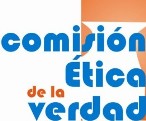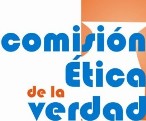We support the efforts of Senator Piedad Córdoba and of Colombians for Peace in promoting dialogue between the parties to the conflict in Colombia.
We, the undersigned, members of the International Ethics Commission for Truth in Colombia, of international human rights and academic organizations and of movements for the affirmation of the rights to Memory, Truth and Justice, SUPPORT THE DECISION OF SENATOR CÓRDABA AND OF COLOMBIANS FOR PEACE IN PROMOTING NEGOTIATIONS FOR AN HUMANITARIAN AGREEMENT, THE SOLUTION TO THE SOCIAL AND ARMED CONFLICT IN COLOMBIA.

The Ethics Commission for the Truth, as a strategy of the National Movement of State Crime Victims (MOVICE), seeks to preserve collective Memory faced with the present absence of guaranties for the truth, justice and integral reparations in Colombia. The testimonies, evidence and reports collected and prepared by the Ethics Commission for the Truth will be presented to a future truth commission in Colombia. The Ethics Commission for the Truth is comprised of 25 organizations and individuals of the highest moral and ethic integrity, many of whom have been victims of have accompanied victims that have suffered under dictatorships, through state repression or war.
In Colombia, there currently do not exist favorable conditions for establishing the truth. While the social and armed conflict continues, with its thousands of forced disappearances, millions of displaced people and hundreds of cases of extrajudicial executions and torture, it is unlikely that secure conditions will exist to enable victims, family members or witnesses to testify.
Colombians for Peace (CPP) is a broad and pluralistic Colombian civil society group that has managed to place the humanization of the armed conflict in Colombia, and the hope for a negotiated solution, once again in the public agenda. The recognition of the armed conflict is an ethical duty. Thanks to the work of the CPP, we hope that more spaces for dialogue with the actors of this war will open from within civil society.
The FARC-EP have unilaterally liberated prisoners and manifested their willingness to negotiate a humanitarian agreement under International Humanitarian Law, which would further the humanization of the war and represent a step towards a negotiated solution to the armed conflict in Colombia.
In addition, the paramilitary commander, Salvatore Mancuso, extradited to the United States, has sent a letter requesting a meeting with Senator Córdoba. Mancuso wishes to address obstacles resulting from his extradition in continuing with the Law 975 process, the so-called Justice and Peace Law. He has affirmed that, “despite difficulties, my intention of honoring the commitments for truth and reparations to victims continues unscathed.”
The Ethics Commission for the Truth in Colombia publicly objected to the extradition of paramilitary commanders by the Álvaro Uribe Vélez administration, denouncing it as a mechanism for legal and political impunity. We expressed our ethical condemnation of the extradition for its negative impacts on the rights of victims and the possibilities of a true democracy in Colombia, given the grave situation of paramilitarization that permeates the Colombian government and the social, political and economic life of the country.
The victims’ version of the truth had been concealed and distorted. In their testimonies received by the Ethics Commission, victims have shared with us this truth: names of those responsible for and those who benefited from the crimes. Among those named are politicians, public officials and national and multinational corporations that have take control of victims’ territory and personal property.
We know from our six visits we have made to Colombia the meaning of continued impunity and of the denial of victims’ rights; For this reason we support the decision of Senator Córdoba that it must be the victims of paramilitary and State crimes themselves that create the conditions to facilitate a meeting with Mancuso and, eventually, with other extradited commanders guilty of crimes against humanity.
We trust that Senator Córdoba, given her ethical standing, high credibility and solidarity with victims, will act according to the wishes of victims.
We appeal to the Colombian government that they be open to the possibility of humanitarian negotiations such as humanitarian exchanges.
We urge President Uribe to accept Senator Cordoba’s request for a personal meeting to seek rapprochements in favor of her proposed humanitarian actions.
We demand that the Colombian government abstain from stigmatizing as supporters of terrorism those who seek the humanization of the armed conflict in Colombia.
We request that the Colombia government guarantee the safety of all those who participate in the humanitarian agreements and debates regarding a negotiated end to the conflict, including members of the FARC-EP.
We urge the FARC-EP to continue advancing, with concrete steps, toward the humanization of the conflict.
As members of the Ethics Commission for the Truth, we reiterate our solidarity with victims and organizations belonging to the National Movement of State Crime Victims and other victims in Colombia.
We look forward to the possibility of future dialogues and offer our presence and participation to the extent requested by victims.
Bogotá, 17 April 2009
Signatures:
Adolfo Pérez Esquivel – Winner of the Nobel Peace Prize, SREPAJ, Argentine
Madres de la Plaza de Mayo – línea fundadora, Mirta Barravalle, Argentine
Association France – Latin America, France
Association of the recuperation of memory of Mérida and Comarca- Spain
Carlos Fazio, professor of Universidad Autónoma of Mexico – UNAM, Mexico
Community of Saint Tomas of Aquino, Madrid, Spain
Eduardo Nachmann, member of H.I.J.O.S. (Region Federal Capital, Argentine)
Enrique Santiago – general secretary of the institute of political studies of Latin America and Africa – IEPALA, Spain
School of The Americas Watch – SOA Watch, Charity Ryerson, Elizbeth Deligio, USA
Espai Catalunya-Comissió Ètica, Antonio Pilgrau, Spain
Francois Houtart – theologian and sociologist, director of the Tri-continental Center – Cetri, Belgium
Gilberto López y Rivas; professor and investigator of the National
Institute of Anthropology and History of Mexico, Mexico
Miguel Álvarez, SERAPAZ, peace and negotiation expert, Mexico
Poor Peoples Economic Human Rights Campaign, Mary Bricker Jenkins;
USA
Rainer Huhle, Human Rights Center of Nurnberg, Germany
Stephen N. Haymes, Professor University DePaul, Chicago, USA
Bernardine Dohrn, Northwestern University School of Law, Chicago, USA

